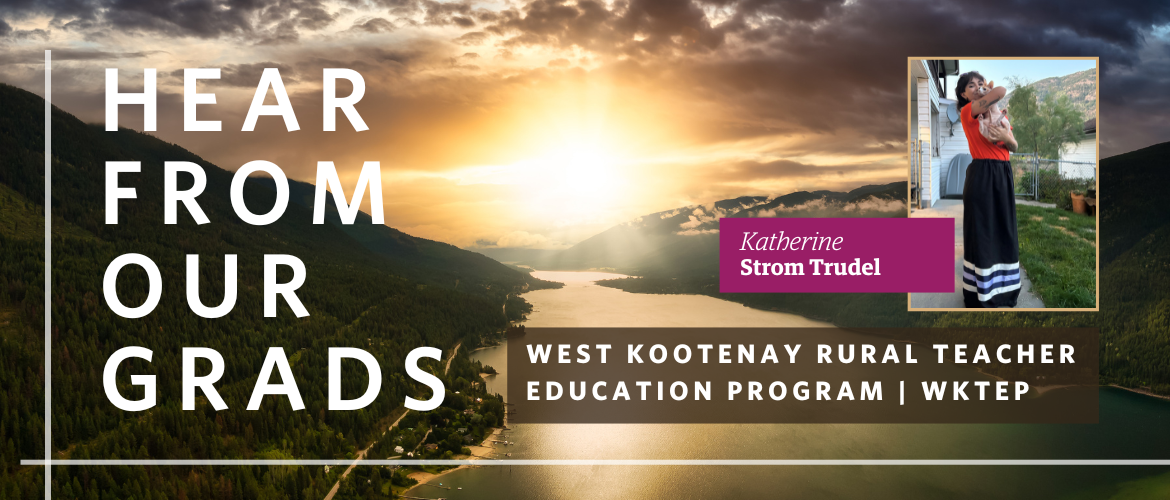
Katherine Strom Trudel, a graduate of the West Kootenay Teacher Education Program (WKTEP), brings both personal history and professional passion to her path as an educator.
Q1. Can you tell me about your Indigenous ancestry and what it means to you?
My background is of mixed Indigenous and settler ancestry. My father’s side is Mohawk from the islands surrounding Tiohtià:ke (Montreal) and French Canadian. My great-grandmother came up from Onondaga territory, and my grandmother was raised on the reservation until she was 6. This was not talked about for many years, and is still a topic met with shudders among my relatives in Quebec. My mother is of mixed settler descent from Norway, France, and England.
Ancestry and the quantification of Indigenous bodies is something that many of us who were raised off the reservation or are reconnecting with their background struggle with. The path is not linear; often, it is met with tears, scars, and dead-ends. Being of Indigenous ancestry does not make me an expert on the experience of ‘Indigeneity’; however, it opens doors of understanding and compassion for those whose experiences have differed from mine but hold similar blood memory.

Q2. What inspired you to pursue teacher education through WKTEP?
I was born and raised on lekwungen and WSANEC territory (Victoria, BC). After feeling like I had exhausted the social, emotional, and physical opportunities of that place, I needed something different. Nelson seemed like a soft place to land, and the draw of the program for me was the rooting in place-conscious pedagogy. After having left the West Kootenays, I was able to fall back in love with the place I’ve called home for my whole life, and that has been such a gift.
Q3. Were there mentors, family members, or community influences who supported you in this path?
Certainly. I have a firm belief that ‘teachers make teachers’. My mother was a massive influence on my pursuit of education. She has done incredible work throughout her career, and I have been lucky enough to follow her through her journey.
I also wanted to pursue education for all of my friends, partners, and community members who slipped through the cracks. Those who really needed an adult to see them and believe that they were (and still are) capable. Every child needs someone on their team to advocate for them, and many folks in my life have helped shape me to follow this vocation.
Q4. How do you see your future role as an educator in relation to your community and students?
As many of my WKTEP colleagues would agree, I don’t shy away from exploring uncomfortable topics. As an educator, I believe that it is crucial that we begin to talk about these uncomfortable topics in order to best support our students; fatphobia, the racism of low expectations, shifting political trends, and the stories we form about ourselves. There were numerous times in my life where I didn’t believe I would make it this far based on the stories that I told myself and that others told me. I think being able to support students in that same position is fundamental for the flourishing of communities.
Q5. What does Indigenous representation in education mean to you?
We need to separate the concept of representation from authenticity and protocol. What really is the idea of Indigenous education? Is it bringing in the non-metaphor of decolonization to our classrooms, or is it community-led practice for Indigenous students? Is it professional development on the First People’s Principles of Learning, or having local Elders in residence? Perhaps it is all of these things, but while we talk about Indigenous representation, we need to talk about where this desire comes from and how to make sure we follow good protocol.
Q6. What advice would I give to other Indigenous students considering teacher education?
Your history is none other than your own; don’t let anyone write over it, meld it with others, or lessen it. Stand firm and tall. Go down to the water often, you’ll need it; even a small amount of change is change nonetheless.
Interview by Melodie Rae Storey, WKTEP Administrative Assistant